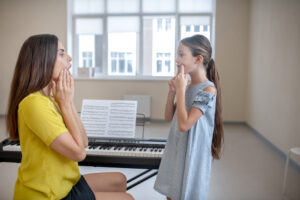We’ve all seen it—a child who steps up to the mic, belts out a song with confidence, and leaves the audience in awe. Naturally, the question follows: Do talented kids need voice lessons if they’re already great performers?
As a team of experienced voice teachers, we love working with gifted young singers. But we also know that raw talent and healthy technique are not the same thing. Below, we’re breaking down the most common myths we hear and offering the truth behind why even the most confident young singers still benefit from lessons.
🎤 Myth vs. Fact: Voice Lessons for Natural Performers
| Myth | Fact |
|---|---|
| “She already sounds amazing—what more could a teacher do?” | A great voice teacher builds breath support, vocal health, and long-term range that raw talent alone can’t sustain. |
| “He doesn’t need lessons—he gets leads in every show.” | Performance success doesn’t always equal proper technique. Without training, bad habits can form and cause vocal strain. |
| “They’re just a kid. Voice lessons are for professionals.” | Kids’ voices are still developing. Voice lessons for children focus on safe, age-appropriate singing—not heavy training. |
| “We don’t want to ‘mess with’ their natural style.” | Good teachers enhance individuality, not erase it. Lessons help young singers express themselves more freely and protect their voice in the process. |
What We Actually Teach in Voice Lessons
Here’s what lessons often include—especially for kids who already love to perform:
- Breath control and posture for stamina
- Pitch accuracy and tone shaping
- Range extension exercises
- Healthy warm-ups and cooldowns
- Style-specific coaching (pop, musical theatre, etc.)
- Performance prep and audition strategies
Even if your child has never hit a wrong note, we help ensure their voice can grow safely and confidently into the future.
The Long Game: Why Early Training Matters
Singers who rely solely on talent often plateau—or worse, develop vocal injuries from overuse or strain. With training, they build:
- Endurance for longer performances
- Flexibility to try new styles
- Confidence to take creative risks
- Knowledge to care for their voice through puberty and beyond
Need an example? Check out our post on common mistakes beginning singers make—most of them apply even to confident performers.
We also recommend reading the National Association of Teachers of Singing guidelines on vocal development in young singers—they offer great insight on age-appropriate expectations.
FAQ: Talented Performers in Voice Lessons
Can lessons make my child sound too “trained”?
No. A good teacher enhances their natural voice and musicality, never replaces it with something robotic or generic.
What age is too young for voice lessons?
We start working on gentle, healthy vocal habits as early as 6 or 7—focusing on breathing, pitch, and confidence, not operatic technique.
Do group choir or theatre rehearsals count as vocal training?
They’re valuable—but not the same. One-on-one lessons give personalized feedback on technique, which group settings can’t always offer.
